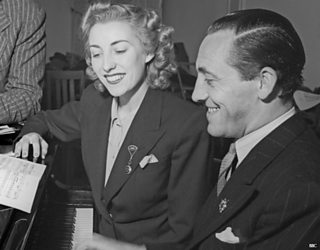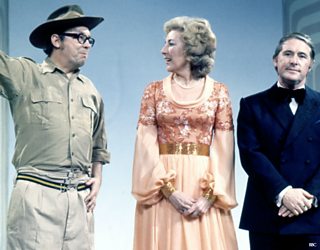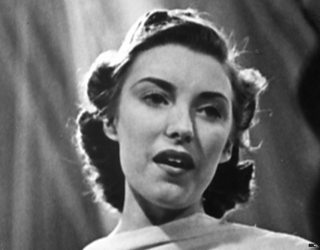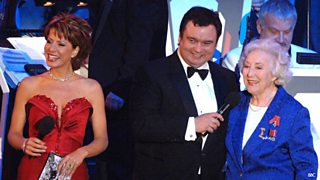
Vera prepares an edition of Yours Sincerely with pianist Fred Hartley during the Second World War.
I noticed recently, among a list of celebrity birthdays in a newspaper, that Dame Vera Lynn had reached the age of 99. There didn’t seem to be much made of it at the time, so we thought we would pay our own tribute to Dame Vera’s long career in radio and television.
Although Dame Vera has been out of the limelight for some time, she only very recently gave up performing at commemorations of the significant events of World War Two, a conflict which changed her from just a popular band and solo singer into one of the few people who really can be described as a National Treasure.
She was born Vera Welch in East Ham in 1917, and was singing in charity concerts by the age of seven. By 16 she had joined Howard Baker’s band, moved to Billy Cotton’s Band at 17, and at 18 the Joe Loss Orchestra. She was already making records, and her first credited appearance on radio was in a programme called in 1935.
In 1937 she joined the and began a long series of broadcasts which stretched well into 1940. Her first television appearance was on 13 April 1938 in Ambrose’s show, where she had three numbers, That Old Feeling, I Know Now and The Bells of St. Mary’s. (Don’t look for it on Genome, due to technical reasons TV listings for that week are not accessible on the site yet).
There were further pre-war television appearances, including with the , a cut-down version of the orchestra, before the service closed on 1 September 1939.

Eric mistakes Vera for Gracie Fields on the 1972 Morecambe and Wise Christmas Show.
By 1940 Dame Vera had started making guest appearances on other shows, such as , a short-lived comedy series starring Dicky Hassett (known for his catchphrase ‘large lumps’!) which came from the team behind ITMA, and , the series for those manning anti-aircraft guns and barrage balloon sites. She made plenty of appearances on the new Forces Programme that started in early 1940.
By the later part of the year, Dame Vera was appearing in the stage revue along with comedian Max Miller. On 2 December 1940, , which featured her recordings, was the first programme dedicated to her alone, broadcast simultaneously on the �������� and Forces Programmes. She was already being billed as ‘Britain’s Sweetheart of Song’, but by March 1941 she was ‘the Forces favourite’, and in June that year she was being called ‘The Forces’ Sweetheart’ – the title by which she has been known ever since.
Towards the end of that year, the Forces Programme began a well-remembered series called . Billed as 'a letter in words and music' to 'the men of the Forces', this presented messages from people on the �������� Front to their menfolk in the services, and congratulated serving fathers of newborn children.
As the war drew to a close, Dame Vera’s appearances were fewer, in part because she spent time travelling the world to visit British forces. She was especially known for her visits to troops in the Far East. Sometimes referred to as the Forgotten Army, they appreciated all the more the fact that she had come so far to perform for them.
There are no credited appearances by Dame Vera in 1946, but her broadcasting resumed in 1947 with the Light Programme series . As television also returned, she appeared on , closely followed by the , in October 1947. Through the 40s and 50s she was a regular presence on radio and television, where she was a constant despite the changed landscape of post-war entertainment, with new stars such as Benny Hill, Terry-Thomas, Frankie Howerd and Julie Andrews sharing the bill with her.

An early appearance by Vera Lynn on band leader Ambrose's television programme, 1938.
Dame Vera had her first solo television series in 1950, , and in December the following year she was the castaway for the first time on . She was still a recording star, with three entries in the first published UK music chart in 1952. She also appeared on stage in revues, including , with Jimmy Edwards and Tony Hancock, excerpts from which were broadcast on radio and TV.
Further television series and radio programmes kept Dame Vera busy in the 1950s. She even turned disc jockey for the series . , in March 1957, saw her and husband Harry Lewis interviewed by Berkeley Smith – as the title suggests, this television programme came from their own house. In December 1959 she was a guest star in old colleague Jimmy Edwards’ school comedy She was also a judge in the 1960 series of the talent competition .
By 1961 she was afforded her first broadcast biography, in , which featured many old friends. In 1965 another radio series on the Light Programme was , the title a reference to her unforgettable wartime hit We’ll Meet Again.
After a break from television she returned in 1967, this time on ��������2, in an edition of the strand. This was followed on the same channel in January 1968 by a guest slot in , with Dame Vera appearing on colour television for the first time. She returned to Show of the Week in , but this time with a series of shows. Television had evolved since her last regular appearances. Her material was sometimes nostalgic, but she also embraced the new world of popular song.
She was the star of in May 1970, and the next day was part of an all-star cast for in aid of Britain’s Commonwealth Games team (other stars included the casts of Dad’s Army and Up Pompeii, Morecambe and Wise and Basil Brush).
More Show of the Week was to come, which by the early 70s started alternating different shows fortnightly, and she turned up on her fellow showbusiness stars’ programmes, such as the 1972 .

Dame Vera with Natasha Kaplinsky and Eamonn Holmes at the 2005 60th anniversary of VE Day in Trafalgar Square.
In 1969 Vera had been awarded the OBE, and in the Birthday Honours List 1975 she was made a Dame for her charitable work, with a at the Savoy Hotel organised by The Variety Club to celebrate the occasion. Her 1975 television series was to be her last, but she continued to make guest appearances on television and radio.
In 1985 she was feted by the industry again, as the Variety Club now hosted a at the London Hilton to mark her 50 years in showbusiness. The following year she was one of the stars celebrating 50 years of television in the .
invited Dame Vera back in 1989, and she was a natural choice to sing for commemorations of VE Day and VJ Day, and other wartime anniversaries, but saw the last time when she gave a full performance at such an event. In 1997 another landmark was celebrated by a special to mark her 80th birthday.
While ��������4 looked back at Dame Vera’s career in 2006 in , the next year her 90th birthday was celebrated by David Jacobs in a on Radio 2, with an interview conducted by Russell Davies.
Dame Vera is a true British star, with decades of success behind her in films, on record, and on radio and television, and is now enjoying a well-earned retirement. In an era where stardom can come and go overnight, and where some careers have been overshadowed by scandal and the dark side of fame, she is someone who has never disappointed her legions of fans and admirers.
